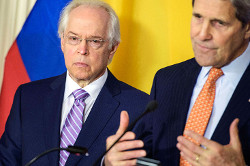US participation in Colombia’s peace talks raises questions about how Colombia will grapple with the tricky issue of granting FARC leaders immunity from extradition to the US, where they are wanted for drug trafficking crimes.
Former US assistant secretary of state for Inter-American Affairs, Bernard Aronson, has been named special envoy to the peace talks being held between the Colombian government and left-wing guerrilla group the FARC in Havana. Aronson, who previously participated in peace efforts in Nicaragua and El Salvador, will not sit at the negotiating table but listen to participants and provide advice and clarification, Colombia President Juan Manuel Santos said.
Local media described the announcement — which came more than two years after negotiations in Havana began — as a sign of US support and a credibility boost for the peace talks
“President [Barack] Obama has come to the conclusion that while significant obstacles remain, a negotiated peace in Colombia is absolutely worth pursuing,” US State Secretary John Kerry said while announcing Aronson’s appointment. As a close ally, the US has a responsibility to aid Colombia in achieving peace, Kerry added.
InSight Crime Analysis
It is worth noting that US participation in the talks has been requested not just by the Colombian government but also the FARC. The degree to which rebel leaders will be held accountable for alleged crimes is a major issue for FARC negotiators, and the US may yet play a key role in deciding the outcome.
The US has imprisoned multiple FARC leaders on charges related to terrorism and drug trafficking and has standing extradition orders for many others. While the release of imprisoned leaders is extremely unlikely, FARC negotiators may seek to ensure standing extradition orders won’t be acted on following a peace deal. Aronson could be the conduit for FARC requests and US clarification on the matter.
Arguably, as potential leverage for its negotiations, the FARC — which draws most of its funding from narcotics — could offer the US intelligence and aid in combating drug trafficking, but that might involve admitting a degree of involvement in the drug trade that the top guerrilla leadership is unwilling to own up to. Additionally, the US may see a vested interest in a peace deal and the increased access to Colombian markets and natural resources that an end to the conflict could bring.
On the other hand, should the US decide to press the matter of extradition, the larger nation’s influence will be hard to deny. The US is a key financial supporter to Colombia, and President Obama has just asked Congress for $288 million for economic and anti-drug trafficking aid to Colombia for 2016. Colombian Senator and peace deal supporter Roy Barreras recently said that implementing the peace deal and consolidating security in Colombia would roughly cost $44.4 billion dollars, which may necessitate even more US financial support and further extend its influence on the negotiations and the fate of FARC leaders.

